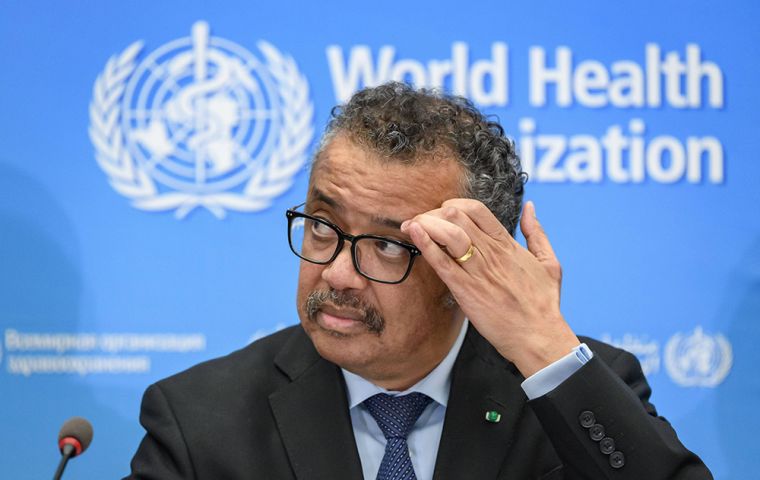MercoPress. South Atlantic News Agency
WHO very worried about rapidly growing surge of Covid-19 in Brazil and Mexico
 “I think Brazil has to be very, very serious,” in combating the surge there. Tedros echoed the same concern for Mexico, which he said was in “bad shape.”
“I think Brazil has to be very, very serious,” in combating the surge there. Tedros echoed the same concern for Mexico, which he said was in “bad shape.” The World Health Organization says it is very worried about the rapidly growing surge of coronavirus cases in Brazil and Mexico. WHO chief Tedros Adhanom Ghebreyesus told reporters at his regular briefing in Geneva on Monday, “I think Brazil has to be very, very serious,” in combating the surge there. He echoed the same concern for Mexico, which he said was in “bad shape.”
“The number of cases doubled, and the number of deaths doubled. ... We would like to ask Mexico to be very serious,” he said. Mexico’s cumulative COVID-19 death toll passed 100,000 on November 20, and the country has added more than 5.000 deaths since then.
Brazil has recorded more than 172,000 deaths from COVID-19, second only to the United States, which has reported more than 267,000 deaths.
On Monday, Brazil’s most populous state, Sao Paulo, ordered shops, bars and restaurants to limit themselves to 40% capacity to try to control the spread of the pathogen.
Meanwhile, drug-maker Moderna said Monday it has applied for emergency authorization in the U.S. and is seeking the same approval in Europe to distribute its coronavirus vaccine after tests showed it is 94% effective.
The request comes shortly after another drug company, Pfizer-BioNTech, sought the same emergency authorization. If granted, inoculations in the U.S. could begin as soon as mid-December.
The Moderna and Pfizer requests for emergency use of their vaccines come as the number of coronavirus cases is surging in the U.S., where tens of thousands of new cases are being recorded daily.
Also Monday, U.S. media reported that Scott Atlas has resigned as a special health adviser to President Donald Trump, after he clashed repeatedly with other members of the coronavirus task force.
Atlas has been criticized by public health experts, including Anthony Fauci, the top U.S. infectious disease expert, for giving incorrect information on the pandemic.
Fauci, director of the National Institute of Allergy and Infectious Diseases, warned Sunday of a possible further spike of COVID-19, the disease caused by the coronavirus, in the United States.
Speaking on the Sunday morning program “This Week,” Fauci, said the infection rate would not “all of a sudden turn around.”
He said in the coming weeks following the recent Thanksgiving holiday, “We may see a surge upon a surge.”
U.S. health officials say nearly 1.2 million people passed through U.S. airports on Sunday after traveling for the Thanksgiving holiday, despite pleas from health experts to stay home for the holiday.
The WHO urged nations Monday to carefully consider the ski season’s risks. It said while the risk of catching the coronavirus is low on the slopes, crowded airports and restaurants could help spread the virus. The agency urged nations to take a “risk-based approach” on which activities to allow.
The global agency also warned Monday that malaria deaths will likely exceed COVID-19 deaths in Africa because of the health care disruptions caused by the pandemic.




Top Comments
Disclaimer & comment rulesCommenting for this story is now closed.
If you have a Facebook account, become a fan and comment on our Facebook Page!